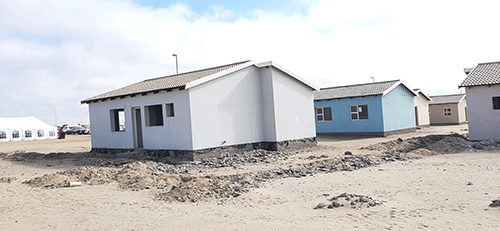SWAKOPMUND – The Chinese-owned construction company, New Era investments, has been appointed by the government to complete 319 houses that were part of an ongoing legal battle between them and Ferusa Capital.
The 319 houses are part of the 891 houses that were expected to be constructed at Swakopmund through the mass housing programme in 2013 after Ferusa Capital was awarded the contract worth N$174 million.
Ferusa Capital, after winning the contract through the National Housing Enterprise (NHE), subcontracted New Era Investments and Desert Paving and Construction to build the houses, but failed to settle some payments to the contractors, who in turn took them to court to recoup payments.
As a result, 505 houses, of which the 319 are part of, could not be completed for almost eight years.
However, urban and rural development minister Erastus Uutoni this week handed over the site after successful negotiations to New Era Investments in Swakopmund.
According to Uutoni, 1 332 houses have been completed and are already occupied by beneficiaries.
“The remaining 505 houses are those that are on this site and are uncompleted, and include the 319 houses that we are handing over to the contractor today for completion. As the ministry entrusted to lead national efforts on housing, we are delighted that we can finally complete these houses. The invaluable role and support by various stakeholders enabled us to come to an agreement with the contractor,” Uutoni said.
According to the minister, Cabinet directed that the disputes be resolved and the houses be completed and handed over to beneficiaries in the shortest possible time.
Also speaking at the site handover, Erongo governor Neville Andre stressed the importance of affordable housing for residents at the coast.
According to Andre, the towns of Swakopmund and Walvis Bay continuously face a challenge with housing.
“What is concerning is that a significant number of these ever-increasing informal settlements lack basic services, such as electricity, clean water and sanitation. Most of the residents of these settlements are left vulnerable to fires, natural disasters, diseases and crime,” Andre explained.
He, however, said the Swakopmund municipality developed various housing models for poor and low-income groups and has over the years also made land available to the Shack Dwellers’ Federation of Namibia.
“The housing backlog is still dire with over 22 000 people still in need of housing in Swakopmund only, especially taking into consideration that the regional economy is recovering and some industries such as mining are resuming again, this will further place pressure on the housing situation,” he said.



